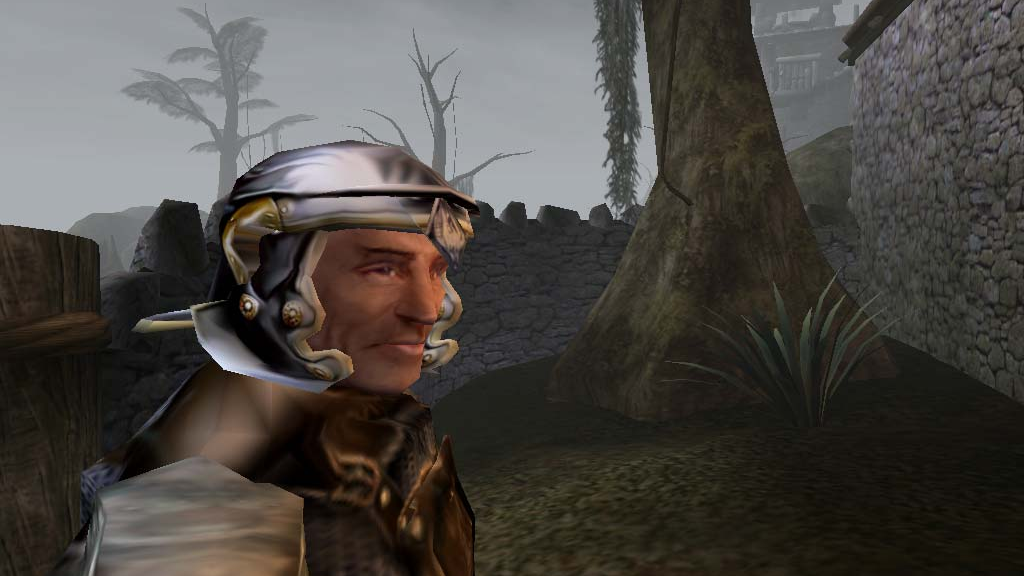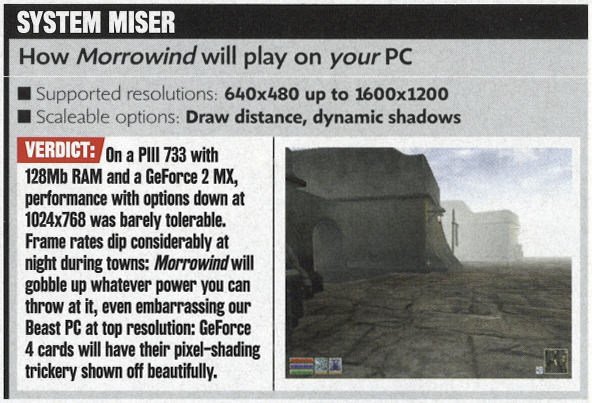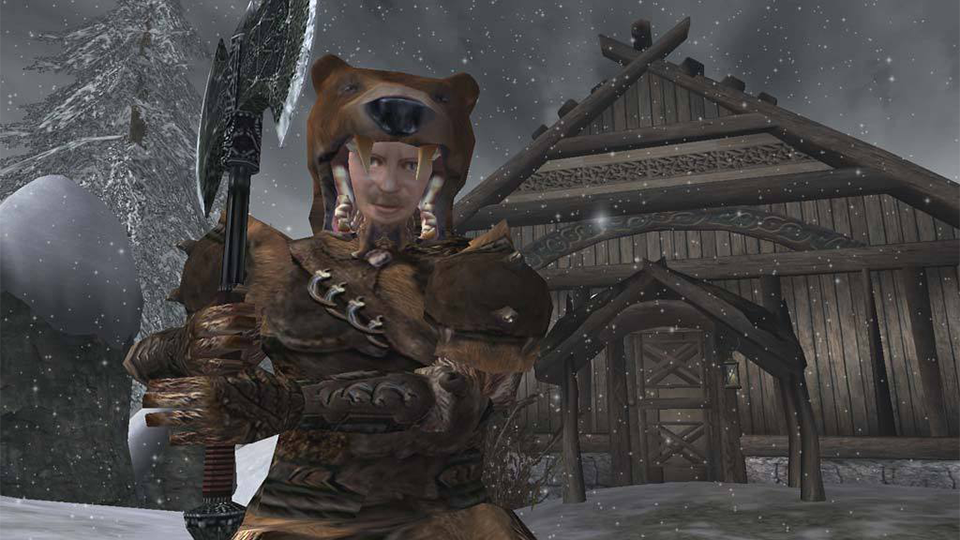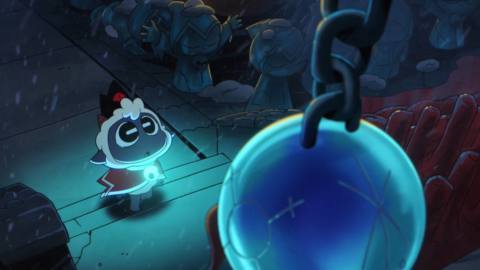To celebrate the 30th anniversary of The Elder Scrolls, we're publishing our original reviews of each main game in the series from our archives. This review first ran in PC Gamer UK issue 111, back in June 2002.
To the outrage of the Morrowind enjoyers of the current PC Gamer team, this is the lowest score the UK mag has awarded for any release in the main series—although 83% is still more than respectable. (Our sister magazine, Edge, was much harsher, awarding it 6/10.) Reading this review, I get the sense that as much as Ross appreciated much of what the game did, he struggled to look past the infamous Bethesda jank. As Ross himself says, “More cynical souls may have a less enthralling experience than those whose imagination can fill in the gaps.” It's a sentiment that, for a certain kind of player, could hold true for any of the Elder Scrolls games.

Developer Bethesda Softworks
Minimum system PIII 500, 128Mb RAM (256Mb with XP)
Recommended PIII 800, 256Mb RAM, GeForce 2
Release date May 1, 2002
I wanted a mission, and for my sins they gave me one. While reviewing Morrowind is hardly a life-threatening quest—and the advice never to get off the boat would prevent progress past the first minute of the game—it's a Herculean task. We're used to RPGs demanding weeks of play and immense patience, but the Elder Scrolls series has always aimed to offer particularly huge and complex worlds. Morrowind takes this to a new extreme.
Developers Bethesda were clearly unsatisfied with the randomised world offered by Daggerfall (PCG 35, 89%) and have sought here to define every quest, location and NPC in detail. The result is an island just three miles across but packed with thousands of unique NPCs, perhaps thirty hamlets, villages and—incredibly—a potential 500 hours of adventuring. Sounds great, doesn't it? And for the most part, the game's mechanics are mightily impressive. But the impression is that Bethesda have aimed for quantity first and foremost; inevitably, quality suffers.
You're a prisoner. Or, rather, you were a prisoner. For reasons unknown to you, you're set free on the island of Vvardenfell at the behest of the Emperor, no less. Things begin organically enough, as you select your character by interacting with the customs officials. You're asked where you're from: selecting a race cleverly sets your height and the first-person viewpoint relative to other characters. Each race also has specific pros and cons in terms of statistics and resistances, and will gain better co-operation with some races than others. And then it really becomes complicated: you can either answer questions relating to how you would react to certain situations, thus deriving your 'natural' class and preferred skills; or you can select a class from a list; or you can manually select every skill bonus yourself.

Every good RPG has a journal, but not every RPG's journal is good. Morrowind's is awful: despite cunning hot-links allowing you to cross-check names and places, the basic, sequential format quickly gets clogged up with useless information, particularly as finished quests are not removed. Pretty soon you'll be clicking through dozens of pages in a desperate search for what one ludicrously named character said about another.
While this will be fairly straightforward to gamers familiar with RPGs, the ramifications of your initial choices are massive. Selecting a skill—say, Conjuration—as a preferential one, it will improve faster with use (there are none of the traditional experience points). Improving your five favoured skills by a total of ten points puts you up a level, allowing you to allocate statistic bonuses—so selecting skills which are used regularly (such as Athletics, which improves while you run) will have your character levelling up faster. Characters specialising in spellcasting or thievery skills (which are used less often) will therefore improve slower. Equally, should you neglect a skill initially, raising it later is tortuous. While every character can use any item or spell, you'll be ineffectual if you're unskilled. The positive side to this arcane system is that you can mix and match your character. Want to be a heavily armoured spell-flinger? Or a lightly armoured, fast-moving archer? You can do all this and much more.
The first-person perspective system works well, allowing you to easily study items—every object in the world has a brief description which flashes up when you look at it. A third-person view was never originally intended to be included, but it's there and allows you to look at your character in all his or her glory. Armour, clothes and weapons are all depicted accurately, and the divided nature of armour (each set is made up of eight pieces) can make for some marvellously mismatched combinations.

Morrowind clearly prides itself on its freeform nature. If you really wanted, you could ignore the suggestions made to you at the start—that you find the person who will kick-start the main quest—and simply head off into the wilds of Vvardenfell to live and die on your own terms. However, you'll soon see the attractions of joining up with one or more of the dozen or so guilds and factions. Being a member offers concessions on guild services (merchants, trainers who can improve your skills for a price and so on) and a safe place to sleep but more importantly it puts quests your way. The absence of an experience point system means that completing these doesn't boost your character in the traditional way, but you'll get the opportunity to flex your skills, which gradually improve as you use them.
The guild quests are ultimately unfocused, distracting you for the complex main quest
Such quests often require travel around the island of Vvardenfell, which is divided into dozens of load areas. Travelling by foot is tortuous, even when running (which depletes Fatigue, leaving you vulnerable). Thankfully, two methods of speedy travel are available between major locations: the bus-like Silt Striders (travel is instant, so you never see them move) and teleportation between branches of the Mages' Guild. You'll still have to slog overland to more obscure locations, though, and finding these can be an absolute nightmare without a paper map (included in the yet-to-be-available-over-here Collectors' Edition). While there's almost endless adventuring to be had via guild quests, they inevitably become slightly rote: although the objectives are always different, there simply isn't enough room in the game for each to be fleshed out with character and atmosphere. The guild quests are ultimately unfocused, distracting you from the complex main quest.
On the other hand, the main quest (which can be finished, if you're single-minded enough, in about 80 hours) is rather better. Working as a spy for the Emperor, you're sent around the island to uncover a plot of intrigue, ancient prophecy and personal discovery (some RPG stereotypes are too precious to abandon). Most encounters with NPCs remain fairly wooden affairs, as much of the conversation spools off a dialogue database shared between many denizens of a certain area. Select a topic from the list and they'll all come out with the same answer, including, on occasion, telling you where to find themselves. Everyone you talk to has a percentage reaction gauge, indicating how much they like you and are willing to co-operate, divulge secrets or offer good prices for goods, items and services. This is an excellent idea in theory, but it's far too easy to exploit. Let's say you've a bundle of magic swords you want to flog, but the nearest merchant doesn't like you much. Use Persuasion (based on your Speechcraft skill) to try and bribe him at ten gold pieces a time. Fail? No problem—try again. You might succeed five times out of ten, having lost 100 gold, but the merchant's improved demeanour means you'll get a far better price for your magic bling. It just doesn't make sense, and it's something you'll encounter time and again.

Equally, stealing your way to riches is also too easy. The penalty for breaking and entering, should you get caught by the rozzers in a civilised town, is usually a moderate fine. Soon, though, you can amass a small fortune in valuable items, which can easily be hawked using the method above, and before long you can afford to train yourself to superhuman status and buy all the best toys without putting yourself in danger or working too hard. There are many ways to success in Morrowind, and being a dumb swordsman is perhaps the hardest. Plump for a high Alchemy skill and you can pluck your way to victory by collecting components from the environment and combining them to make valuable potions. You can even manufacture your own, unique spells by combining known effects (or have them made for you, for a price).
Whereas the finest RPGs have the atmosphere and story to suck in every gamer, Morrowind requires limitless reserves of patience and disbelief-suspension
As history teaches us, conflict is inevitable. Melee combat is simple enough: draw your weapon, get close enough to see your enemy's dandruff—and click. There are three different attacks (chop, slash and thrust) which do different amounts of damage depending on the weapon and how long you hold down the button, and are activated by moving while clicking (though I recommend the 'always use best attack' option). Missile weapons are even simpler (just point and click), as are spells. The business of fighting is resultingly soulless: you've never any idea how much you're hurting your target, and enemies' tactics vary only from 'attack and charge' to 'charge and attack'. Tramping through the hills of Vvardenfell is dangerous, and you'll be attacked from time to time, though these encounters scale to your character's level so you'll rarely be outclassed.
I desperately want to be able to praise Morrowind unreservedly for creating a believable, self-contained fantasy world in which, even once the main quest has been completed, you can carry on living and adventuring. But whereas the finest RPGs have the atmosphere and story to suck in every gamer, Morrowind requires limitless reserves of patience and disbelief-suspension. It feels mechanical at every turn—consequently, more cynical souls may have a less enthralling experience than those whose imagination can fill in the gaps. Bethesda are to be congratulated for the scale and depth of Morrowind's world and system, but to be honest it should have been a quarter of the scale and four times as artfully made. Size, it seems, isn't everything.






